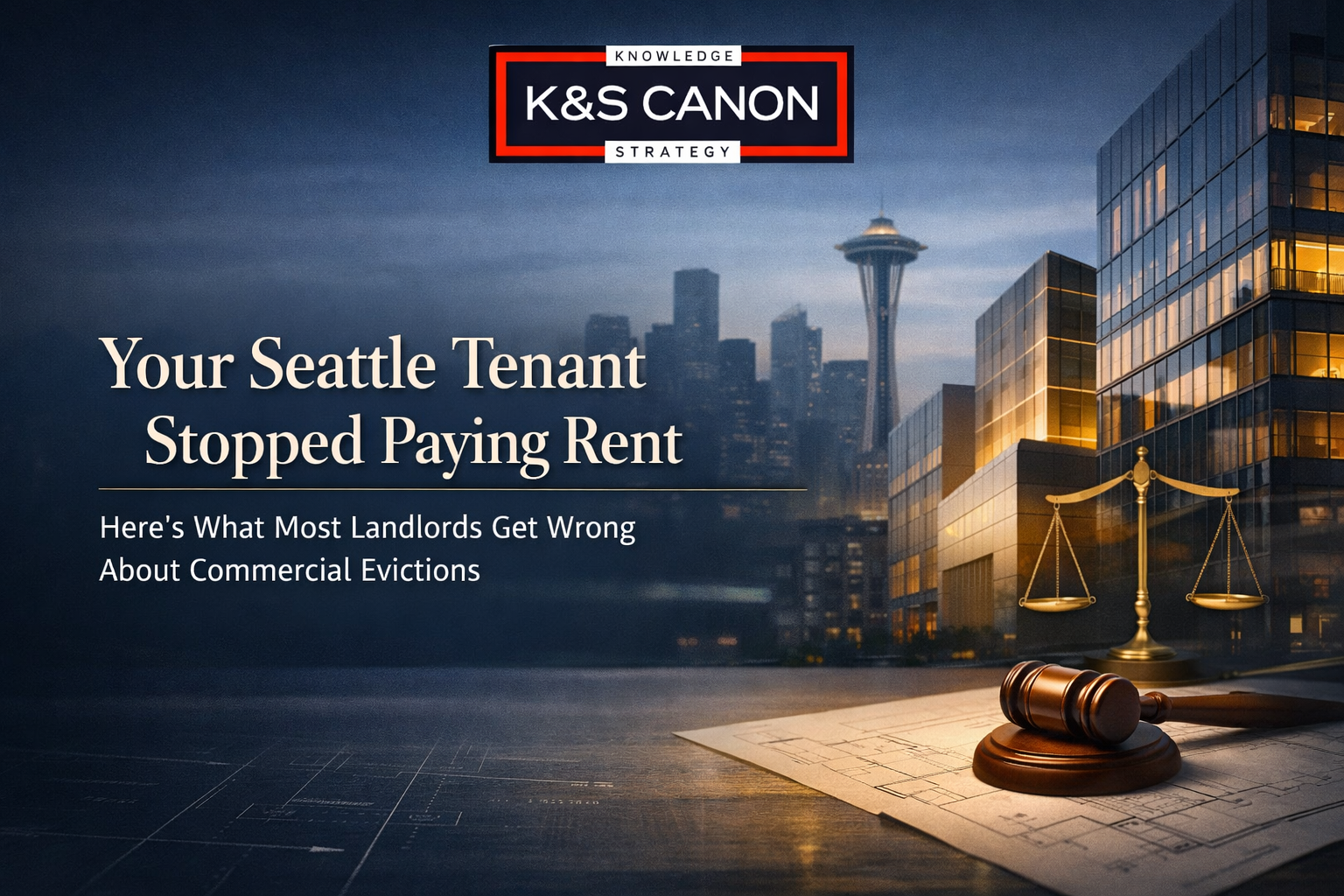Construction Contract Disputes in Washington: When to Negotiate, Mediate, or Litigate

Consider the following hypothetical: your general contractor claims the concrete work cost $30,000 more than estimated and demands payment, but you never approved a change order. If you are two months behind schedule with half your budget spent and no agreement about who owes what, you may have an incoming uphill battle.
Construction disputes happen on most projects of any size. The question isn't whether conflicts will arise but rather how you handle them when they do.
Most Common Construction Dispute Types
Payment disputes tend to dominate construction conflicts. Contractors may claim they're owed more than owners will pay. Owners could withhold payment claiming work was incomplete or defective. Subcontractors then wouldn’t get paid when general contractors face cash flow problems.
These disputes often involve:
- Disagreements about whether change orders were properly authorized
- Claims that unforeseen site conditions justify extra payment
- Disputes over whether completed work meets contract specifications
- Arguments about payment timing and withholding of funds
- Coordination failures between multiple trades on projects
Delay claims create frequent conflicts. Projects fall behind schedule for numerous reasons, and determining responsibility proves difficult. Contractors blame owners for slow decisions or permit delays. Owners blame contractors for insufficient staffing or poor planning.
Quality disputes arise when work doesn't meet contract requirements. These cases require determining whether work actually violates specifications or whether owner expectations simply exceed what the contract required.
Scope disputes usually involve disagreements about what the original contract included. Contractors may consider something as extra work and then require additional payment. Owners may have considered that necessary work as part of the base contract scope.
Washington Prompt Payment Requirements for Public Projects
Washington law establishes specific payment timing requirements for public works projects. Private construction projects are not covered by these statutory payment requirements.
For public projects, public entities must pay prime contractors within 30 days after receiving proper payment requests or receiving goods and services. If projects are funded by grants or federal money not yet received, then the payment deadline extends until 30 days after receiving those funds.
Prime contractors on public projects must pay subcontractors within 10 days of receiving payment from the public entity. This 10-day requirement applies to each tier of the payment chain.
Public entities withholding payment must provide written notice within 8 working days explaining specifically why payment is withheld and what remedial actions are required. Payments improperly withheld accrue interest at 1% per month.
Private construction projects in Washington have no statutory prompt payment requirements. Contract terms between parties govern payment timing on private work.
How Retainage Functions on Washington Projects
Retainage limits for public and private projects differ under Washington law.
For public projects, owners may withhold up to 5% of contract amounts as retainage. Public project retainage must be released within 60 days of project completion and acceptance, or within 30 days for contracts where 10% retainage was withheld in lieu of bonding.
For private projects, Washington law effective July 2023 limits retainage to 5% of the contract price of completed work. This applies to most private commercial construction but excludes single-family residential construction of fewer than 12 units.
Private project retainage must be released with interest at 1% per month on amounts not paid within 30 days after work completion and owner acceptance. Contractors or subcontractors can provide retainage bonds instead of actual fund withholding if they meet statutory requirements.
Retainage creates disputes when parties disagree about work completion or whether punch list items justify continued withholding. Many subcontractors face double retainage situations where both owners and general contractors withhold percentages from their payments.
When Arbitration or Mediation Clauses Control
Many construction contracts require disputes to be resolved through arbitration or mediation rather than court litigation. Washington courts generally enforce these clauses when properly drafted.
Arbitration clauses require disputes to be heard by private arbitrators rather than judges. Arbitrator decisions are final and binding, with very limited appeal rights. Courts enforce arbitration agreements and dismiss lawsuits when valid arbitration clauses exist.
Mediation clauses require parties to attempt mediated resolution before filing lawsuits or arbitrations. These are generally enforceable, though courts cannot force settlement if mediation doesn't produce agreement.
Some contracts include multi-step procedures requiring negotiation first, then mediation, then arbitration. Courts typically enforce these sequential requirements, dismissing premature filings.
Contract language controls whether arbitration or mediation applies. Parties should review their contracts carefully to determine what dispute resolution procedures they agreed to follow.
Discovery in Construction Litigation
Discovery refers to the formal process where parties exchange information and evidence before trial. Construction cases typically involve extensive documentation and expert witness work.
Document discovery includes:
- Complete project files including all correspondence
- Payment records, invoices, and financial documentation
- Change order documentation (or lack thereof)
- Daily logs, progress photos, and project records
- Specifications, drawings, and contract documents
- Email and text message communications about the project
Parties can request any documents relevant to claims or defenses. Failure to produce required documents can result in court sanctions.
Depositions allow attorneys to question witnesses under oath before trial. Construction cases often involve depositions of project managers, superintendents, design professionals, expert witnesses, and key decision makers.
Discovery in construction cases typically takes 6-12 months, but every case is unique. Complex multi-party cases can take longer. The process costs significant money, often $30,000-$100,000 or more per party depending on case complexity.
Expert Witnesses in Construction Cases
Most construction disputes require expert testimony. Washington courts generally don't allow lay witnesses to testify about technical construction matters, building codes, or industry standards without proper qualifications.
Qualified experts typically include:
- Licensed contractors with relevant project experience
- Structural or civil engineers
- Architects
- Construction cost estimators or quantity surveyors
- Project scheduling experts
- Building code specialists or former inspectors
Each party usually retains multiple experts depending on dispute issues. Experts charge $300-$500 per hour or more for investigation, report writing, depositions, and trial testimony.
Expert costs can accumulate quickly. Cases involving structural issues, schedule delays, and cost overruns might require three or four experts per side, with total expert costs possibly reaching $50,000-$100,000 per party.
Change Order Documentation Requirements
Most construction disputes involve claims that work changed from original scope. Proper documentation prevents many of these conflicts.
Effective change orders include:
- Clear description of changed work scope
- Specific cost impact with supporting detail
- Schedule impact analysis
- Signatures from authorized representatives of both parties
- Reference to contract provisions being modified
Many contracts require written change orders signed by both parties before changed work begins. These provisions are intended to protect owners from surprise claims and protect contractors from disputes about authorization.
Contractors often proceed with work based on oral instructions or email exchanges, then face payment disputes. Owners often approve minor changes informally, then question costs when invoices arrive.
Best practice involves documenting every change before work proceeds. This seems administratively burdensome during active construction but prevents expensive disputes later.
Statute of Limitations for Construction Claims
Washington law establishes deadlines for filing construction-related lawsuits. Missing these deadlines bars claims regardless of merit.
For breach of written contract claims, Washington's statute of limitations is six years from the breach date. Breach typically occurs when payment isn't made as required or when a party fails to perform contractual obligations.
For breach of oral contract claims, the statute of limitations is three years.
Construction defect and related claims face additional timing rules under RCW 4.16.310. These claims must be filed within six years of substantial completion of construction or termination of services, whichever is later. This represents both a statute of limitations and a statute of repose that bars claims that haven't accrued within the six-year period.
Courts strictly enforce these deadlines. Lawsuits filed even one day late get dismissed.
When Direct Negotiation Makes Sense
Many construction disputes get resolved through direct negotiation between parties without formal mediation or litigation. This works best when:
- Disputes involve relatively manageable amounts
- Both parties want to preserve business relationships
- Facts and legal issues are relatively straightforward
- Neither party faces immediate time pressure
- Both sides are represented by counsel or equally sophisticated
Negotiation costs far less than mediation or litigation. It allows parties to create solutions that courts couldn't order.
Negotiation fails when parties hold deeply entrenched positions, when one party negotiates unreasonably, or when the business relationship has broken down completely.
How Mediation Functions
Mediation involves a neutral third party facilitating settlement discussions. Mediators don't decide who's right but help parties find mutually acceptable solutions.
Mediation works well when:
- Direct negotiations have reached impasse
- Parties need reality testing about their legal positions
- Cases involve complex issues requiring expert input
- Relationships are strained but not completely destroyed
- Both parties genuinely want to resolve disputes
Washington courts often order mediation in construction cases. Judges understand that most cases eventually settle, and mediation accelerates that process.
Mediators typically charge $300-$500 per hour, with sessions lasting 4-8 hours. Each party pays attorney fees plus half the mediator's fee. Total costs per party typically run $3,000-$8,000.
Many construction cases settle at mediation. The process forces both sides to confront weaknesses in their positions and provides structured paths toward resolution.
When Litigation Becomes Necessary
Some disputes cannot be resolved through negotiation or mediation. Litigation becomes necessary when:
- The other party refuses reasonable negotiation
- You need court orders to preserve evidence or prevent further damage
- Statute of limitations deadlines approach
- Mediation has failed without resolution
- Disputes involve legal issues requiring judicial determination
- One party is judgment-proof and only insurance proceeds will provide recovery
Litigation costs vary widely based on complexity. Simple payment disputes might cost $25,000-$50,000 per party through trial. Complex multi-party construction defect cases can cost $150,000-$300,000 or more per party.
Trials typically occur 18-24 months after filing in King County Superior Court, though timelines vary by county and case complexity.
Most cases settle before trial, often during weeks immediately before scheduled trial dates when parties finally confront the reality of trial costs and risks.
Making Informed Resolution Choices
The appropriate dispute resolution choice depends on numerous case-specific factors. Consider:
- Amount of money at stake
- Complexity of legal and factual issues
- Strength of your legal position and available evidence
- Value of preserving business relationships
- Time pressures affecting your situation
- Available resources for legal fees and costs
Small disputes rarely justify expensive litigation. Large disputes with strong legal positions and evidence often warrant more aggressive approaches.
Most cases fall between extremes, where negotiation or mediation offers the best balance of cost, time, and outcome certainty.
Preventing Disputes Through Better Contracts
The best dispute resolution involves preventing disputes before they start. Well-drafted contracts anticipate common problems and provide mechanisms for addressing them.
Strong construction contracts include:
- Clear scope of work descriptions with detailed specifications
- Well-defined change order procedures
- Payment terms that comply with applicable Washington law
- Clear dispute resolution procedures
- Defined standards for work quality and completion
- Realistic timelines with procedures for handling delays
Contracts cannot prevent all disputes, but they reduce frequency and provide frameworks for resolution when conflicts arise.
Real Costs of Construction Disputes
Financial costs receive most attention, but construction disputes impose additional costs that are harder to quantify:
- Management time diverted from productive work
- Damaged business relationships in relationship-driven industries
- Reputation impacts affecting future work opportunities
- Emotional and psychological stress
- Lost opportunities while focused on disputes
These indirect costs often exceed direct legal fees. A six-month dispute might cost $50,000 in legal fees but $200,000 in lost opportunities and management distraction.
Smart construction professionals factor these total costs into dispute resolution decisions. Sometimes paying more than legally required costs less than proving you were right.
Handling Construction Conflicts
Construction disputes are part of the business. Projects can involve too many people, moving parts, and sometimes more money than anticipated for everything to proceed perfectly.
Successful contractors, owners, and developers handle disputes efficiently when they arise. This means choosing appropriate resolution methods, documenting issues properly, and understanding when compromise serves interests better than fighting.
Every construction dispute involves unique facts, relationships, and legal issues. Strategies that work for one dispute may not work for another. Washington law provides multiple paths for resolving construction conflicts, each with different costs, timelines, and likely outcomes.
For parties involved in construction disputes in Washington state, consulting with an attorney experienced in construction law helps evaluate options and choose resolution paths most likely to serve your interests. K&S Canon assists contractors, property owners, and developers throughout the Seattle area with construction disputes and contract issues.
Contact K&S Canon to discuss your construction dispute and resolution options.
Disclaimer: This information is for educational purposes only and does not constitute legal advice. Construction disputes involve complex legal and factual issues that vary significantly based on contract terms, project specifics, and individual circumstances. Washington's construction law continues to develop through new statutes and court decisions. Consult with a qualified construction attorney to discuss your specific dispute and protect your rights. This article addresses general principles that may not apply to your particular situation.




